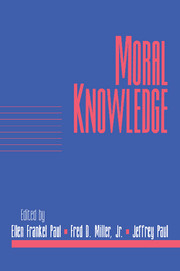Book contents
- Frontmatter
- Contents
- Introduction
- Acknowledgments
- Contributors
- Realist-Expressivism: A Neglected Option for Moral Realism
- Thinking about Cases
- But I Could Be Wrong
- Moral Facts and Best Explanations
- Two Sources of Morality
- “Because I Want It”
- Realism, Naturalism, and Moral Semantics
- Incomplete Routes to Moral Objectivity: Four Variants of Naturalism
- Explanation, Internalism, and Reasons for Action
- Moral Knowledge as Practical Knowledge
- Practical Reason and Moral Psychology in Aristotle and Kant
- Hypothetical Consent in Kantian Constructivism
- Mill's “Proof” of the Principle of Utility: A More than Half-Hearted Defense
- Index
Incomplete Routes to Moral Objectivity: Four Variants of Naturalism
Published online by Cambridge University Press: 04 August 2010
- Frontmatter
- Contents
- Introduction
- Acknowledgments
- Contributors
- Realist-Expressivism: A Neglected Option for Moral Realism
- Thinking about Cases
- But I Could Be Wrong
- Moral Facts and Best Explanations
- Two Sources of Morality
- “Because I Want It”
- Realism, Naturalism, and Moral Semantics
- Incomplete Routes to Moral Objectivity: Four Variants of Naturalism
- Explanation, Internalism, and Reasons for Action
- Moral Knowledge as Practical Knowledge
- Practical Reason and Moral Psychology in Aristotle and Kant
- Hypothetical Consent in Kantian Constructivism
- Mill's “Proof” of the Principle of Utility: A More than Half-Hearted Defense
- Index
Summary
INTRODUCTION
The search for moral objectivity has been constant throughout the history of philosophy, although interpretations of the nature and scope of objectivity have varied. One aim of the pursuit of moral objectivity has been the demonstration of what may be termed its epistemological thesis, that is, the claim that the truth of assertions of the goodness or Tightness of moral acts is as legitimate, reliable, or valid as the truth of assertions involving other forms of human knowledge, such as common sense, practical expertise, science, or mathematics. Another aim of the quest for moral objectivity may be termed its pragmatic formulation; this refers to the development of a method or procedure that will mediate among conflicting moral views in order to realize a convergence or justified agreement about warranted or true moral conclusions. In the ethical theories of Aristotle, David Hume, and John Dewey, theories that represent three of the four variants of ethical naturalism (defined below) that are surveyed in this essay, the epistemological thesis and the pragmatic formulation are integrated or combined. The distinction between these two elements is significant for the present essay, however, since I want to show that linguistic naturalism, the fourth variant I shall examine, has provided a demonstration of the epistemological thesis about moral knowledge, even if the pragmatic formulation has not been successfully realized.
There is a significant difference between the ways in which the search for moral objectivity has been carried out in the ancient and modern periods. In the ancient period, the degree of confidence ascribed to beliefs in objective morality was at least as great as that ascribed to the results of investigations in astronomy, physics, or biology.
- Type
- Chapter
- Information
- Moral Knowledge , pp. 177 - 217Publisher: Cambridge University PressPrint publication year: 2001



